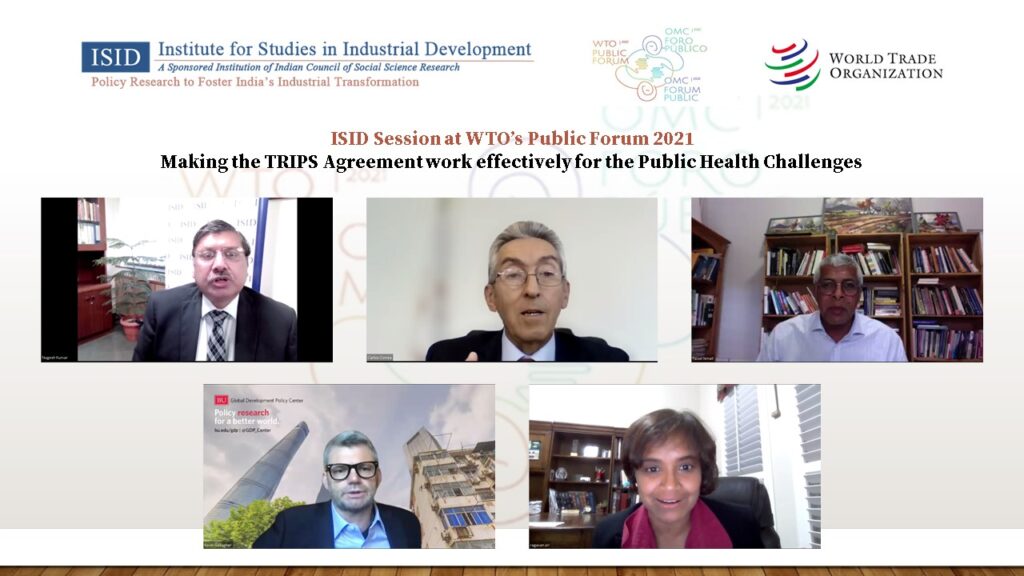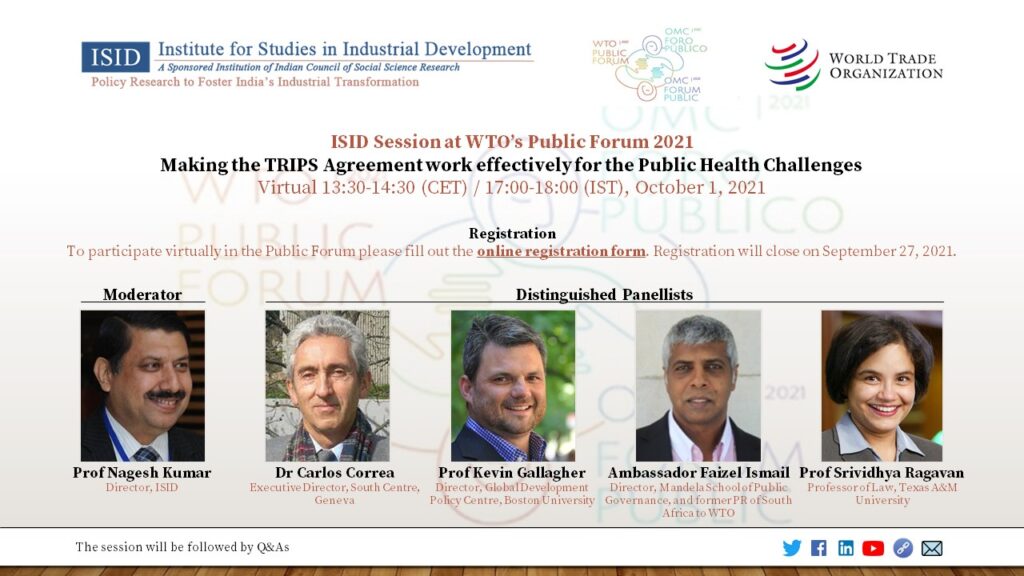The ISID organised a webinar on “Making the TRIPS Agreement Work Effectively for the Public Health Challenges” on October 1, 2021. Eminent panellists included Dr Carlos Correa, Executive Director, South Centre, Geneva; Prof Kevin Gallagher, Global Development Policy Centre, Boston University; Amb Faizel Ismail, Director, Nelson Mandela School of Public Governance, University of Cape Town; and, Prof Srividhya Ragavan, Professor of Law, Texas A&M University. Prof Nagesh Kumar, Director, ISID, moderated the session.

In his opening remarks, Prof Kumar highlighted the inequities in the distribution of COVID-19 vaccines and pointed out that the Doha Declaration on TRIPS (Trade-Related Aspects of Intellectual Property Rights) Agreement and Public Health has been of limited relevance to WTO members in addressing the pandemic. It was in this context that the TRIPS Waiver proposal was initiated in the WTO, demanding temporary waiver of certain IPRs for facilitating access to vaccines and other COVID treatments.
Reflecting on the constraints that developing countries face in exercising TRIPS flexibilities, Dr Correa pointed out some major constraints which include the fear of economic sanctions by advanced countries, especially the US; intense lobbying made by the pharmaceutical industry globally, including in developing countries, to discourage the exercise of such flexibilities; interpretation of TRIPS provisions by WTO panels based on trade jurisprudence, without regarding the policy objectives of IPRs; and, TRIPS Plus provisions in the FTAs is undermining the TRIPS flexibilities.
On the significance of the TRIPS Waiver proposal Amb Ismail pointed out that it is very specific and pragmatic. It is only making a demand for a waiver from the current rights of patent holders so that vaccines become more accessible and affordable to the majority of the world’s population. The amended proposal makes it clear that all health products and technologies for the prevention and treatment of COVID-19 should be subjected to this waiver. As this proposal is very specific and for a limited period (to address the pandemic), hence it should be supported.
On the issue of equitable distribution of COVID-19 vaccines, Prof Gallagher emphasised three pillars of vaccine equity. They are TRIPS Waiver, technology transfer, and robust financing. TRIPS Waiver will remove all the legal barriers in scaling up vaccine production. Technology needs to be transferred to those who have production capabilities. It is estimated that $23 billion is needed to upgrade facilities to take advantage of TRIPS Waiver.
According to Prof Raghavan, the COVID-19 pandemic has led to the realisation that there will be no trade if peoples’ health is not protected, health trumps trade. Regarding the merits of the proposal, she said that TRIPS Waiver is essential for many reasons. It waives all IPRs as opposed to patents. The waiver will make the rule uniform for all relevant IPRs. It can minimise the cumbersome procedure involved in issuing CL and can result in scaling up local production. According to her, a public health treaty, starting with this pandemic and ready to address all future public health challenges without compromising on innovation and that can lead to sustainable development, is the need of the time.
Abstract: The COVID-19 has exposed the world to new challenges in public health that call for use of a range of medical products – PPEs, diagnostics, medical devices, therapeutics and vaccines. Access to these products is highly inequitable and scaling up of production faces some major challenges including from intellectual property rights (IPRs). The compulsory licensing provision of the TRIPS Agreement is extremely cumbersome when several patents covering the product are spread across the value chain. The Agreement does not provide for public health exemptions in the case of other IPRs involved in the COVID-related products – copyrights, industrial designs and undisclosed information. Addressing these challenges would require the integration of various kinds of technologies. This session seeks to discuss the reforms of the Agreement that may enable it to respond to such public health challenges, the incidence of which is likely to rise in the future with climate change.
In this session, leading experts will address following questions.
- Are the public health exemptions provided in the TRIPS Agreement effective in helping Members to address public health crises?
- Why are intellectual property rights a barrier for less developed countries in responding effectively to Covid-19 pandemic?
- What are the areas where the TRIPS Agreement needs reform to make it truly reflect emerging public health challenges?
Moderator: Prof. Nagesh Kumar, Director, ISID, New Delhi
Distinguished Panelists
- Dr Carlos Correa, Executive Director, South Centre, Geneva
- Kevin Gallagher, Director, Global Development Policy Centre, Boston University
- Faizel Ismail, Director, Nelson Mandela School of Public Governance, University of Cape Town and former PR of South Africa to WTO
- Srividhya Ragavan, Professor of Law, Texas A&M University
Open discussion
Registration:
Online registration for in-person participation at this year’s Public Forum is now closed. To participate virtually in the Public Forum please fill out the online registration form.
Registration will close on 27 September 2021.
Short Bios
Prof Nagesh Kumar is Director of the Institute for Studies in Industrial Development (ISID), a New Delhi-based public-funded policy think-tank. During 2009-April 2021, served UNESCAP, Bangkok, as its Chief Economist, Division Director, and Head, South Asia Office. Earlier (2002-2009), Dr Kumar was the Director-General, Research and Information System for Developing Countries, a New Delhi-based policy think-tank. During 1993-98, he was Economist, UNU-MERIT, Maastricht, the Netherlands. Besides consulting for the World Bank, ADB, ILO, UNIDO, UNCTAD, a.o., he has served on the boards of Exim Bank of India, ICTSD-Geneva, SACEPS-Dhaka. A PhD from Delhi School of Economics, Dr Kumar is recipient of the Exim Bank’s first International Trade Research Award and GDN’s Research Medal. Dr. Kumar has researched extensively on different aspects of economic development, resulting in the publication of 18 books, over 30 flagship reports of United Nations and RIS, and over 120 peer-reviewed papers, attracting over 7200 Google citations.
Carlos Correa is the Executive Director of the South Centre. Prior to this, he was the Special Advisor on Trade and Intellectual Property of the South Centre. Correa is a renowned international authority on intellectual property and technology issues. Correa has worked with the Argentine government and has been the Director of the Center for Interdisciplinary Studies on Industrial Property and Economics (CEIDIE) at the Law Faculty of the University of Buenos Aires. He was a member of the UK Commission on Intellectual Property Rights, the Commission on Intellectual Property Rights, Innovation and Public Health established by the World Health Assembly and of the FAO Panel of Eminent Experts on Ethics in Food and Agriculture. He has been a visiting professor in post-graduate courses of several universities and consultant to various regional and international organizations. Correa has advised several governments on intellectual property, innovation policy and public health.
Kevin Gallagher is a professor of global development policy at Boston University’s Frederick S. Pardee School of Global Studies, where he directs the Global Development Policy Center. Gallagher serves on the United Nations’ Committee for Development Policy and co-chairs the T-20 Task Force on International Financial Architecture at the G-20. He previously served on the investment sub-committee of the Advisory Committee on International Economic Policy at the US Department of State and on the National Advisory Committee at the Environmental Protection Agency. Gallagher has been a visiting or adjunct professor at the Paul Nitze School of Advanced International Studies at Johns Hopkins University, the Fletcher School of Law and Diplomacy at Tufts University; El Colegio de Mexico in Mexico; Tsinghua University in China, and the Center for State and Society in Argentina. He is the author or co-author of six books in the area of investment, trade and development.
Faizel Ismail is the Director of the Nelson Mandela School of Public Governance at the University of Cape Town. Prior to this, he worked in the Government of South Africa for over 20 years as a trade negotiator. Ismail has served as the Ambassador of South Africa to the WTO (2010-2014) and was the Deputy Director-General for International Trade and Economic Development (ITED) in the Department of Trade and Industry. As South Africa’s Chief Trade Negotiator since 1994, he led the new democratic South Africa’s trade negotiations with the European Union, Southern African Development Community (SADC), Southern African Customs Union (SACU) and several other bilateral trading partners, including the United States, India and Brazil. Ismail has published three books on WTO and published over 50 journal articles, book chapters and working papers on international trade.
Srividhya Ragavan is a Professor of Law at the Texas A&M School of Law and the Faculty Director of the School’s India Program and the University’s ADVANCE Fellow. Ragavan’s scholarship emphasizes issues intersecting international trade law with intellectual property rights. Ragavan’s books include Patents and Trade Disparities in Developing Countries (2012); Diversity in Intellectual Property: Identities, Interests, and Intersections (Eds., Calboli, 2019) and Intellectual Property Law and Access to Medicines (Eds., Vanni, 2021). She has law reviews on impactful issues relating to intellectual property law and pharmaceutical patenting. Under Ragavan’s leadership, the School founded the blog, www.traderxreport.com; established GIFTED, Pathway Programs with top Indian law schools; Executive Education Program on Health, Pharmaceuticals and Intellectual Property Rights in partnership with Confederation of Indian Industry (CII); a Certificate Program on Intellectual Property Prosecution designed for Indian Attorneys. Ragavan also established the Shamnad-Basheer Fellowship to promote a white-paper on issues of international relevance.


